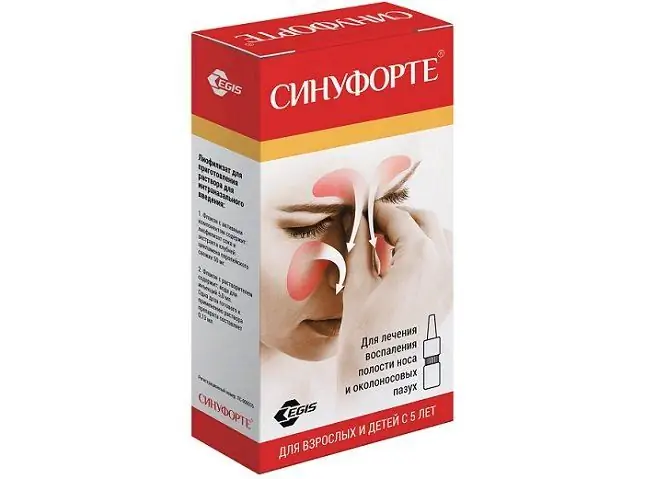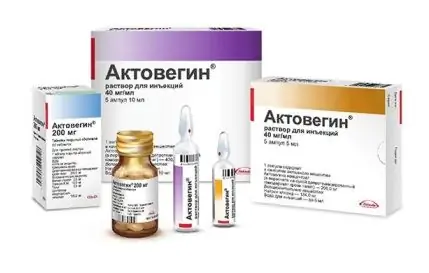- Author Rachel Wainwright wainwright@abchealthonline.com.
- Public 2023-12-15 07:39.
- Last modified 2025-11-02 20:14.
Disulfiram
Disulfiram: instructions for use and reviews
- 1. Release form and composition
- 2. Pharmacological properties
- 3. Indications for use
- 4. Contraindications
- 5. Method of application and dosage
- 6. Side effects
- 7. Overdose
- 8. Special instructions
- 9. Drug interactions
- 10. Analogs
- 11. Terms and conditions of storage
- 12. Terms of dispensing from pharmacies
- 13. Reviews
- 14. Price in pharmacies
Latin name: Disulfiram
ATX code: N07BB01
Active ingredient: disulfiram
Manufacturer: Sanofi Winthrop Industry (France), Warsaw Pharmaceutical Works Polfa (Poland), Hubei Maxpharm Industries Co. (China)
Description and photo update: 2019-13-08

Disulfiram is a drug used in the treatment of alcoholism.
Release form and composition
Disulfiram is available in the form of tablets for implantation (10 pcs. In glass vials, 1 vial in a cardboard box).
The composition of 1 tablet includes:
- Active ingredient: disulfiram - 100 mg;
- Auxiliary components: mannitol, sodium chloride, polyethylene glycol 6000.
Pharmacological properties
Pharmacodynamics
Disulfiram significantly alters the enzymatic system of ethyl alcohol metabolism by inhibiting aldehyde dehydrogenase, resulting in the formation of metabolites that are safe for the body. This significantly increases the level of acetaldehyde, an ethanol metabolite that has toxic properties and determines the effectiveness of the drug. With the introduction of disulfiram, the patient develops such unpleasant symptoms as a sharp drop in blood pressure, tachycardia, dyspeptic disorders, severe asthenia, hot flashes. This intoxication with acetaldehyde is designed to cause disgust and weaken the patient's cravings for drinking.
Pharmacokinetics
After being introduced into the body, disulfiram is rapidly and almost completely (about 70-90%) absorbed in the digestive tract. The substance is characterized by intense metabolism, during which it is reduced to diethyldithiocarbamate, which is excreted through the kidneys in the form of glucuronide, or decomposes to form carbon disulfide and diethylamine [part of carbon disulfide (4-53%) is excreted through the lungs].
Indications for use
According to the instructions, Disulfiram is prescribed in the treatment of alcohol dependence for cooperating and selected patients as an adjuvant.
Contraindications
- The state of alcoholic intoxication, the use of drinks containing ethyl alcohol 12 hours before the procedure;
- Mental disorders, psychoses (excluding previous acute alcoholic psychoses), history of suicide attempts;
- Established arterial hypertension, ischemic heart disease, heart failure, previous peripheral circulatory failure;
- Lactation period;
- Hypersensitivity to the components of the drug, as well as to thiocarbaminates.
Disulfiram should not be administered without the patient's informed consent.
The use of the drug in the first trimester of pregnancy is not recommended. When prescribing Disulfiram to pregnant women, it is necessary to balance the benefits of therapy with the possible risk. In this case, it is necessary to take into account the available data on the occurrence of congenital malformations in infants whose mothers used the drug in combination with other drugs.
Instructions for the use of Disulfiram: method and dosage
Tablets for implantation must be sterile, free of impurities and damage, stored in their original packaging.
Implantation is carried out after careful disinfection and local anesthesia, making a small incision (about 6 mm) in the left iliac region. The incision should be low enough to prevent friction from the belt. The subcutaneous tissue is pushed apart and with the help of a trocar 2 tablets of Disulfiram (100 mg each) are injected subcutaneously (subfascial) to a depth of 4 cm. The procedure must be repeated 4 times, placing the tablets around the incision site in a star-like manner, parallel to the skin surface.
The total dose is 8-10 tablets (800-1000 mg). A suture is applied to the incision, followed by a sterile dressing. You can repeat the procedure after 8-9 months.
If the tablets were implanted too close to the incision site, a rejection phenomenon may occur. Due to friction of the implantation site with a belt or premature removal of sutures, suppuration may develop.
Side effects
The drug Disulfiram can lead to the development of such side effects (due to the properties of the active substance) such as: drowsiness, vomiting, nausea, taste of garlic or a metallic taste in the mouth, unpleasant odor in patients with colostomy, damage to hepatocytes, rare cases of hepatitis (similar disorders are sometimes observed in non-alcoholic patients with nickel eczema), optic neuritis, polyneuritis of the lower extremities, confusion, memory loss, asthenia, transient impotence, headache, allergic dermatitis, fatigue. In rare cases, psychotic reactions may develop, including schizophrenia, mania, paranoid and depressive states.
Due to the combination of disulfiram-ethyl alcohol, the following disorders may occur: respiratory failure, cardiovascular collapse, heart rhythm disturbances, angina pectoris, sometimes myocardial infarction, as well as neurological disorders, depression of consciousness, up to coma, cerebral edema. When alcohol is taken in an amount of more than 50-80 ml of 40% ethanol, it is possible to develop severe disorders of the respiratory and cardiovascular systems, edema, and convulsions. In these cases, it is necessary to carry out detoxification and symptomatic therapy with concomitant administration of analeptics.
Overdose
An overdose of Disulfiram can lead to the development of such threatening symptoms as neurological disorders of a different nature, coma, collapse. In this case, symptomatic treatment is prescribed.
special instructions
Before implantation, it is necessary to conduct a course of gradual weaning of the patient from alcohol.
During therapy with Disulfiram, the use of alcoholic beverages is strictly prohibited, as this can lead to the development of life-threatening symptoms. In this regard, the drug can be used only with the consent of the patient and provided that he is informed about the existing dangers associated with alcohol consumption when using Disulfiram. The drug can be prescribed after a very detailed history and assessment of all the disadvantages and advantages of such treatment for alcoholism.
Signs of alcohol intolerance can also develop after using liquids that contain alcohol (for example, cough syrups, sauces, mouthwashes, vinegar, warming aids, aftershave, and other alcohol-based cosmetics).
Disulfiram should be used with caution in patients with hepatic or renal insufficiency, diseases of the cardiovascular or respiratory systems, epilepsy, diabetes mellitus. The disulfiram reaction can lead to the deepening of these diseases.
Polyneuropathy, which can develop during therapy, goes away with the appointment of B vitamins or removal of the implanted tablets. A small tubercle may form at the implantation site, which is caused by fibrosis of the subcutaneous and adipose tissue of the skin. With the simultaneous appointment with oral anticoagulants, it is necessary to carry out more frequent monitoring of the content of prothrombin in the blood and adjust the doses of anticoagulants, which is associated with a high probability of bleeding.
Drug interactions
With the simultaneous use of Disulfiram with certain drugs, the following effects may occur:
- Antithrombotic drugs, antipyrine, phenytoin, chlordiazepoxide and diazepam: enhancing their action;
- Peptidine, morphine, amphetamine: enhancement of their action (data obtained from experiments on animals);
- Amitriptyline, chlorpromazine: increased symptoms of disulfiramic reaction;
- Diazepam: relief of symptoms of disulfiram reaction;
- Rifampicin: inhibition of the oxidation reaction and its excretion by the kidneys;
- Isoniazid: effect on the functioning of the central nervous system, the development of dizziness, impaired coordination of movements, irritability, insomnia;
- Metronidazole: development of disorientation and psychotic states (combined use is not recommended);
- Organic solvents containing alcohol, acetaldehyde or paraldehyde: development of the disulfiram reaction;
- Alfentanil: an increase in the duration of its action.
Analogs
Disulfiram analogs are: Exorran, Crotenal, Refusal, Antiethyl, Tetradin, Dizetil, Aversan, Antabus, Lidevin, Teturam, Espenal, Abstinil, Esperal, Anticol, Alkophobin, Antiethane, Contrapot, Stoptil, Tetlong, Radiotra.
Terms and conditions of storage
Store in a dark, dry place out of reach of children at temperatures up to 25 ° C.
Shelf life is 4 years.
Terms of dispensing from pharmacies
Dispensed by prescription.
Reviews about Disulfiram
According to reviews, many relatives of alcoholic patients try to use Disulfiram without the knowledge of the patient himself (as a rule, they secretly try to treat using the oral form of the drug). However, experts strongly recommend contacting the clinic for more effective therapy, because it will not work to implant a pill or inject Disulfiram intravenously without being noticed: this should be done only in a hospital setting and under the strict supervision of a doctor. Also, the combination of therapy with regular intake of alcohol in large quantities can provoke serious adverse reactions.
Many drug therapists argue that treatment for alcoholism should be a conscious choice of the patient, who should tune in to him psychologically. However, reviews of such therapy are quite rare and do not fully confirm the effectiveness of Disulfiram.
Disulfiram price in pharmacies
The price of Disulfiram is currently unknown as it is not available for sale. However, its analogs are available for purchase: Teturam - 190-215 rubles (the package includes 50 tablets), Esperal - 1770-2100 rubles (the package includes 20 tablets), Lidevin - 1297-1505 rubles (the package includes 20 tablets).

Anna Kozlova Medical journalist About the author
Education: Rostov State Medical University, specialty "General Medicine".
Information about the drug is generalized, provided for informational purposes only and does not replace the official instructions. Self-medication is hazardous to health!






